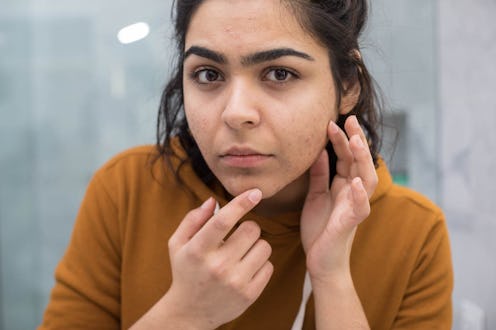Life
7 Surprising Red Flags You Need To See A Dermatologist

Most of us know to go see a dermatologist when we have persistent acne or a suspicious looking mole, but we experience plenty of skin changes all the time, and it's not always obvious when they could be serious. It's important to be aware of when to see a dermatologist based on the surprising hints your skin might be giving you, as this can not only help you fix any issues, but it can also help spot any illnesses or diseases that you didn't realize these symptoms might indicate.
"A board-certified dermatologist can tell a lot about what is going on with your body just from looking at your skin," dermatologist Dr. Jordan Carqueville tells Bustle. "Anything unusual appearing on your skin could be an indication of a more serious health problem and not just something at the surface level. A dermatologist is your first step in a diagnosis who can then provide an informed treatment plan and could prevent the progression of a serious medical condition."
Experiencing some of these symptoms is no reason to panic — sometimes they're common symptoms associated with easy-to-treat skin conditions — but it's good to get them checked out of if you're unsure. Here are seven surprising red flags that experts say mean you should see a dermatologist.
1You're Always Blushing
Most of us have some redness on our skin, but constant blushing doesn't mean you're embarrassed all the time. "You can get blushing of the face in a butterfly distribution with systemic lupus erythematosus, or SLE," dermatologist Dr. Debra Jaliman tells Bustle. "This is an autoimmune disease that is chronic and can be diagnosed with a simple blood test." Along with this type of rash, those who have lupus often experience extreme fatigue, and painful or swollen joints. If you notice these symptoms do not panic — consult with your doctor regarding a diagnosis and treatment.
2Your Skin Is Very Dry
Dry skin during winter is no reason to worry, but if you're noticing your skin is drier than usual, you'll want to get checked out. "If your skin is very dry, you may have a thyroid problem," says Jaliman. "It may indicate an under-active thyroid called hypothyroid. A blood test will diagnose this." For some people, having drier skin is common, and dry skin doesn't always indicate a thyroid problem. But if you also notice your dry skin is accompanied by fatigue, loss of hair, and muscle weakness, check with your doctor to see if your thyroid is to blame.
3You're Very Pale
Although some people have a naturally pale complexion, take note if you are more pale than usual. "If you are pale you may be anemic," says Jaliman. "You will also probably feel fatigued, short of breath and have cold hands and feet. It's important to go to the doctor for a blood test and have a complete blood count." Because losing color around your face can be linked to many illnesses, it is important to talk with your doctor to find out what the cause may be. If it is anemia, depending on the diagnosis, iron supplements may be able to help you to start feeling better.
4You're Losing Hair
It's normal to lose a few strands daily, but if you have increased hair loss, your dermatologist can help you. "Losing lots of hair might be blamed on stress, but there are other reasons a person can be suffering from this condition," says Carqueville. "Hair loss could be an indication of a thyroid problem or an autoimmune condition. A thorough examination may pinpoint the cause and a treatment plan can be developed." If you are finding more hair in your brush than normal, do not worry. Your doctor can help you figure out what's causing your hair loss, and how to get your health back on track.
5You're Sweating A Lot
Everyone has different levels of what is considered typical-level sweat, but sweating more than usual can indicate a health problem. "If you’re sweating more than normal, you may be suffering from hyperhidrosis, and a visit to a dermatologist can be helpful," says Carqueville. Hyperhidrosis is a condition that causes you to sweat excessively, even if you are not hot, or not exercising. "Hyperhidrosis can be treated with topical and oral medications, injectable treatments, and various surgical procedures. Your board-certified dermatologist can help in deciding what is best for you."
6You Have Yellow Or Brittle Nails
Your nail health matters, and weak nails might warrant a trip to your doctor. "Covering yellow nails with a coat of nail polish may be a temporary solution, but this condition could indicate a fungal or bacterial infection," says Carqueville. "A dermatologist can prescribe medication to treat the infection," and have your nails feeling strong again.
7You Have A Sore That Lasts A Few Weeks
An abnormal freckle or mole isn't the only thing that should be checked: Any lingering sores should be as well. "When a sore doesn’t heal within a few weeks it could be a sign of cancer," dermatologist Suzanne Friedler, MD FAAD tells Bustle. Sores that are reoccurring, or do not heal properly can also be signs of an infection or inflammation. If you find that these sores keep popping up on your skin, talk to your dermatologist about possible causes.
Although skin issues can occasionally be subtle, by being mindful of your health and what your skin is trying to tell you, you can better take care of yourself overall.